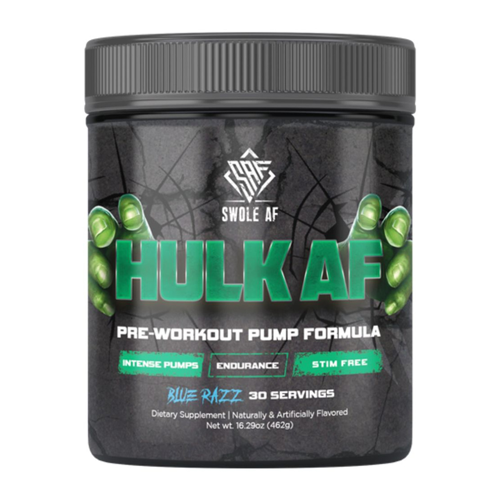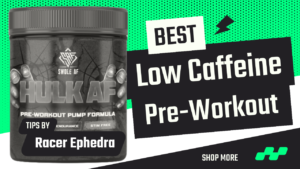How long it takes for pre-workout to kick in can vary from person to person, but in general, you should expect to feel its effects within an hour of taking it. Pre-workout is a multi-ingredient supplement designed to prime your body for performance, providing increased energy, focus, and athletic performance support.
Most pre-workout products are formulated to be taken 20-30 minutes before exercise. This allows the active ingredients in the formula to have enough time to be metabolized by your body. However, keep in mind that everyone’s metabolism is different, so the timing may vary slightly.

Caffeine Stimulant Energy Levels
One of the key ingredients commonly found in pre-workout supplements is caffeine. Caffeine is a stimulant that can help increase energy levels and improve focus. It typically takes about 30 minutes for caffeine to start taking effect. You may feel more alert and have a boost of energy during your workout.
Another common ingredient in pre-workout supplements is beta-alanine. Beta-alanine is an amino acid that helps increase muscle endurance and reduce fatigue. It is often responsible for the tingling sensation that some people experience after taking pre-workout. The effects of beta-alanine can take a bit longer to kick in compared to caffeine, usually within an hour or so.
Pre-Workout Effects Factors
It’s important to note that the effects of pre-workout can vary depending on factors such as your tolerance to stimulants, body composition, and overall sensitivity. Some individuals may feel the effects sooner, while others may take longer. Additionally, the intensity and duration of your workout may also influence how quickly you notice the effects of pre-workout.
To make the most out of your pre-workout supplement like Gorilla Mode, it’s recommended to follow the instructions provided by the manufacturer. Start with the recommended dosage and assess how your body responds. If you find that the effects are not as noticeable as you’d like, you can gradually increase the dosage (within recommended limits) after consulting with a healthcare professional or sports nutritionist.
Therefore, pre-workout supplements generally take around an hour to kick in, with caffeine and beta-alanine being two of the most common ingredients responsible for their effects. However, individual responses may vary, so it’s important to listen to your body and adjust dosage accordingly. Remember to consult with a healthcare professional or sports nutritionist if you have any concerns or questions about using pre-workout supplements.
Pharmacology of Caffeine
Caffeine, the most widely used central nervous system (CNS) stimulant in the world, has a complex pharmacology and a wide range of physiological effects. It affects various systems in our body, including the cardiovascular, respiratory, renal, and smooth muscle systems. Additionally, it has effects on our mood, memory, alertness, and physical and cognitive performance. Let’s dive into the details of the pharmacology of caffeine.
First, let’s talk about the chemical structure of caffeine. Its scientific name is 1,3,7-trimethylxanthine, and its chemical formula is C8H10N4O2. In its pure form, caffeine appears as a bitter white powder.
Now, let’s discuss the metabolism of caffeine. When we consume caffeine, it is rapidly absorbed into our bloodstream through the gastrointestinal tract. From there, it undergoes metabolism primarily in the liver. The main enzyme responsible for metabolizing caffeine is cytochrome P450 1A2 (CYP1A2). This enzyme converts caffeine into three primary metabolites: paraxanthine (84%), theobromine (12%), and theophylline (4%). These metabolites also contribute to the overall effects of caffeine in our body.
Moving on to the physiological effects of caffeine, let’s start with its cardiovascular effects. Caffeine acts as a vasodilator, meaning it widens our blood vessels, leading to increased blood flow. This effect can improve oxygen delivery to our muscles and organs. However, in high doses or in individuals who are sensitive to caffeine, it can also cause increased heart rate and blood pressure.
Caffeine Respiratory Effects
In terms of its respiratory effects, caffeine acts as a bronchodilator. It relaxes the smooth muscles of our airways, making it easier to breathe. This property is why caffeine is sometimes used in certain medications for asthma.
Caffeine also affects our renal system by increasing urine production. This diuretic effect can lead to increased urine output and potentially increased fluid loss if consumed in high quantities. However, it’s worth noting that regular moderate consumption of caffeine does not lead to dehydration.
When it comes to its effects on mood and cognition, caffeine acts as a stimulant for the central nervous system. It blocks adenosine receptors in our brain, which helps to keep us awake and alert. This mechanism also contributes to its ability to improve focus and concentration.
Furthermore, caffeine has been shown to enhance memory and cognitive performance. It improves information processing speed and can enhance short-term memory and attention span.
In terms of physical performance, caffeine has been widely studied for its ergogenic effects. It can increase endurance and reduce perceived exertion during exercise. Caffeine achieves this by stimulating the release of adrenaline and increasing the availability of fatty acids for energy production.
Additionally, caffeine is a powerful CNS stimulant with numerous pharmacological and physiological effects. It affects various systems in our body and has been shown to improve cardiovascular function, respiratory function, mood, memory, alertness, and physical performance. However, it’s important to consume caffeine in moderation and be aware of individual sensitivities or potential adverse effects. As always, consulting with a healthcare professional is recommended when considering any changes to your diet or lifestyle.
Beta-Alanine and Citrulline to Kick In
Great question! The length of time it takes for pre-workout ingredients to kick in can vary depending on the specific ingredient. Let’s break it down for you.
One commonly used ingredient in pre-workouts is beta-alanine. You may have noticed a harmless tingling sensation on your skin after consuming a pre-workout. Well, that’s thanks to beta-alanine! This ingredient reaches peak plasma levels within about 30 minutes of consumption. So, you can expect to start feeling its effects relatively quickly.
Now, let’s talk about arginine and citrulline. These amino acids are also frequently found in pre-workouts because of their ability to increase plasma nitric oxide levels, which contributes to the pump sensation. Research has shown that arginine and citrulline typically reach their peak plasma levels about an hour after consumption. So, you might need to give them a little more time to kick in compared to beta-alanine.
It’s important to note that individual factors can also influence how long it takes for pre-workout ingredients to take effect. Factors such as metabolism, body weight, and whether you’ve eaten before taking the pre-workout can all play a role.
More over, beta-alanine usually kicks in within 30 minutes, while arginine and citrulline may take around an hour to reach peak plasma levels. Keep in mind that everyone is different, so these timelines can vary slightly. It’s always a good idea to follow the instructions provided by the specific pre-workout product you’re using and listen to your body’s response. Happy workouts!
Pharmacokinetics of β-Alanine
The pharmacokinetics of β-Alanine can be quite complex, and there is still much research being conducted to fully understand its effects on the body. One thing that has been observed is a high inter-individual variation in the ergogenic response following long-term ingestion of β-Alanine.
In simpler terms, this means that different people may experience different effects when taking β-Alanine as a supplement. Some individuals may see significant improvements in their athletic performance, while others may not experience any noticeable changes.
What’s interesting is that this variation in response is not only seen in the ergogenic effects, but also in the pharmacokinetic plasma profile. In other words, the way β-Alanine is metabolized and processed by the body can vary greatly from person to person.
A study found that both fixed dose strategies and personalized dosing strategies resulted in similar levels of inter-individual variability in the pharmacokinetic plasma profile. This means that regardless of whether a person took a fixed dose or a personalized dose based on their body weight, there was still a wide range of responses observed.
Plasma Response
Surprisingly, when researchers tried to account for body weight in order to improve the consistency of the β-Alanine plasma response, they found that it did not have a significant impact. This suggests that body weight alone may not be the best indicator for determining the optimal dose of β-Alanine for an individual.
To address this issue, the researchers suggest putting more effort into developing easy-to-use and scientifically justified personalized dosing strategies. By taking into account factors beyond just body weight, such as metabolic rate or genetic predisposition, it may be possible to optimize the dosing of β-Alanine for each individual.
Altogether, the pharmacokinetics of β-Alanine are still not fully understood, and there is a high degree of inter-individual variation in both its ergogenic effects and its plasma profile. Personalized dosing strategies that go beyond just using body weight as a factor may hold the key to maximizing the benefits of β-Alanine supplementation.
Pharmacokinetics of L-arginine
L-arginine is a highly interesting compound that has been gaining attention in recent years, particularly in the field of cardiovascular diseases. It is considered as a potential therapeutic agent due to its role as a precursor of nitric oxide. Nitric oxide is a molecule that plays a crucial role in various physiological processes, including blood vessel dilation and regulation of blood pressure.
To understand the pharmacokinetics of L-arginine, let’s dive into the findings of a recent study conducted on healthy humans. The study aimed to provide basic knowledge about how L-arginine behaves in the body when administered orally.
The study revealed that both intravenous and oral administrations of L-arginine exhibit a biphasic pattern, meaning that there are two distinct phases in its absorption and elimination. However, it’s important to note that the study focused on healthy individuals, and further research is needed to determine if the same profile is observed in patients with cardiovascular diseases.
When L-arginine was administered orally at a dose of 10 grams, the peak concentration in the blood was found to be approximately 50.0±13.4 μg/ml. This peak concentration occurred around 1 hour after administration.
These findings indicate that L-arginine is absorbed well after oral administration and reaches its peak concentration in a relatively short amount of time. This information is valuable for understanding how L-arginine may be used as a therapeutic agent in patients with cardiovascular diseases.
L-Arginine and Dietary Supplements
It’s worth mentioning that L-arginine is available as a dietary supplement and is commonly used by athletes and fitness enthusiasts for its potential benefits on exercise performance and muscle growth. However, it’s important to consult with a healthcare professional before starting any new supplement regimen, especially if you have underlying health conditions or are taking other medications.
Certainly, the pharmacokinetics of L-arginine have been studied in healthy humans, revealing a biphasic pattern with a peak concentration occurring around 1 hour after oral administration. Further research is needed to determine if similar pharmacokinetic profiles are observed in patients with cardiovascular diseases. If you’re considering using L-arginine as a therapeutic agent or dietary supplement, it’s always best to seek guidance from a healthcare professional who can provide personalized advice based on your specific needs and medical history.
Best Pre Workout Supplement: Unleash Your Inner Beast
Are you ready to take your workout to the next level? Look no further than the best pre-workout supplement on the market. With the right blend of ingredients, you can experience explosive energy, intense focus, and incredible muscle pumps. In this comprehensive guide, we will explore the top pre-workout supplements available and help you find the perfect one to unleash your inner beast.
The Importance of Pre-Workout Supplements
Before we dive into the best raw pre-workout supplements, let’s understand why they are essential for maximizing your performance in the gym. Pre-workout supplements are specially formulated to provide your body with the nutrients and energy it needs to push through intense workouts. They can help increase endurance, enhance focus, improve strength, and boost muscle pumps. By fueling your body with the right ingredients before hitting the gym, you can optimize your training and achieve your fitness goals faster.
Multi-ingredient Dietary Preworkout Supplement
Dietary preworkout supplements have gained significant popularity among both recreational exercisers and athletes. These supplements are designed to enhance performance and provide an energy boost before a workout. However, there is still limited research on the effects of these supplements on the vasculature, both at rest and during exercise.
A recent study aimed to fill this research gap by investigating the impact of a multi-ingredient dietary preworkout supplement on vascular function in young, recreationally active adults. The study involved twelve participants, consisting of nine males and three females, with an average age of 24.5 years and a body mass index (BMI) of 24.3 kg/m2.
The participants were instructed to supplement with the preworkout formula for one week, and their vascular function was assessed both at rest and immediately after an acute resistance exercise session. The results of this study shed light on the potential effects of these supplements on vascular health.
Potential Benefits and Risks
It is important to note that this study was conducted on a small sample size, and further research is needed to draw definitive conclusions. Nonetheless, the findings provide valuable insights into the potential benefits or risks associated with using multi-ingredient dietary preworkout supplements.
If you are considering incorporating such a supplement into your fitness routine, it is crucial to consult with a healthcare professional or a registered dietitian who can guide you based on your individual needs and goals. They can help you understand the potential benefits and risks associated with these supplements and determine whether they are suitable for you.
Comparatively, the effects of multi-ingredient dietary preworkout supplements on vascular function are still not well-studied. While they may provide an energy boost and enhance performance, it is essential to approach their use with caution and seek professional guidance. Prioritize your health and safety above all else when considering any dietary supplement.
Key Ingredients to Look for in Pre-Workout Supplements
When choosing the best pre-workout supplement, it’s crucial to consider the ingredients. Look for a product that contains a blend of scientifically proven compounds that can deliver the desired results. Here are some key ingredients to watch out for:
1. L-Citrulline D-Malate
Increased blood flow is essential for delivering oxygen and nutrients to your muscles during exercise. L-Citrulline D-Malate is a compound that boosts nitric oxide production, leading to improved blood flow and enhanced muscle pumps. It can also help reduce muscle fatigue and improve endurance.
2. Creatine Monohydrate
Creatine Monohydrate is one of the most well-researched and effective supplements for increasing muscle strength and power. It works by replenishing ATP stores in your muscles, allowing for greater energy production during high-intensity exercises. By including creatine in your pre-workout supplement, you can experience improved performance and faster muscle recovery.
3. Beta-Alanine
Beta-Alanine is an amino acid that helps increase muscular endurance by buffering lactic acid buildup. This allows you to push through fatigue and perform more reps before reaching exhaustion. By including Beta-Alanine in your pre-workout, you can extend your workout duration and maximize your training volume.
4. Caffeine
Caffeine is a popular stimulant that can enhance focus, alertness, and energy levels. It stimulates the central nervous system, helping you stay motivated and perform at your best during workouts. However, it’s important to note that caffeine sensitivity varies among individuals, so it’s essential to find the right dosage that works for you.
5. BCAAs (Branched-Chain Amino Acids)
BCAAs are essential amino acids that play a crucial role in muscle protein synthesis and recovery. They can help reduce muscle soreness, prevent muscle breakdown, and promote muscle growth. Including BCAAs in your pre-workout can provide the necessary fuel for your muscles and facilitate faster recovery post-workout.
These are just a few key ingredients to look for in a pre-workout supplement. The best products will have a well-rounded blend of ingredients that target various aspects of performance enhancement.
Top Pre Workout Supplements on the Market
Now that you understand the importance of pre-workout supplements and the key ingredients to look for, let’s explore some of the best options available:
1. Product A: Hulk AF
Hulk AF is a non-stimulant pre-workout pump formula designed to help muscles explode with fullness and vascularity. With ingredients like L-Citrulline D-Malate, Creatine Monohydrate, and Glycerol Monostearate, it promotes increased blood flow, improved muscle performance, and faster recovery. Hulk AF also includes Sodium, which regulates water balance in the body, ensuring optimal hydration during workouts.
2. Product B: Krank3D
Krank3D utilizes a proprietary compound called Citrulline Silicate (Nitro Rx), which is known for its strong nitric oxide-boosting properties. By inhibiting the arginase enzyme, Krank3D ensures a wealth of L-arginine is available for nitric oxide production, leading to maximum muscular vasodilation. This pre-workout is designed to optimize muscle growth, training intensity, and recovery.
3. Product C: Jack3D
Jack3D is a high-stimulant pre-workout supplement that delivers explosive energy and focus. With ingredients like L-Arginine Alpha-Ketoglutarate, Creatine Nitrate, and Beta Alanine, it enhances muscular performance, strength, and endurance. Jack3D is formulated to provide the ultimate boost for intense workouts and maximize your training potential.
These are just a few examples of the top pre-workout supplements available. Each product has its unique blend of ingredients and benefits, so it’s essential to choose one that aligns with your specific fitness goals and preferences.
How to Choose the Best Pre Workout Supplement for You
With so many pre-workout supplements on the market, choosing the best one for your needs can be overwhelming. Here are some factors to consider when making your decision:
1. Your Fitness Goals
Different pre-workout supplements may cater to specific fitness goals. If you’re looking to build muscle and increase strength, a product with ingredients like Creatine Monohydrate and BCAAs would be beneficial. On the other hand, if you’re focused on endurance and cardiovascular performance, a supplement with Citrulline Malate and Beta-Alanine might be more suitable. Consider your goals and choose a product that aligns with them.
2. Sensitivity to Stimulants
If you’re sensitive to stimulants like caffeine, it’s important to choose a pre-workout supplement that offers non-stimulant options. Look for products that prioritize focus, muscle pumps, and endurance without relying on high levels of caffeine.
3. Taste and Mixability
Let’s face it – pre-workout supplements don’t always have the best taste. However, some brands have invested in flavors and formulations that are more enjoyable to consume. Read reviews and choose a product that not only delivers on its promises but also offers a taste that you can tolerate.
4. Price and Value for Money
Pre-workout supplements can vary significantly in price. Consider your budget and evaluate the value for money offered by each product. Look for brands that provide transparent ingredient lists and high-quality formulations at a reasonable price.
5. Customer Reviews and Reputation
One of the best ways to gauge the effectiveness of a pre-workout supplement is by reading customer reviews and assessing the brand’s reputation. Look for products with positive feedback and a track record of delivering results.
Remember, every individual is unique, and what works for someone else may not work for you. It may take some trial and error to find the best pre-workout supplement that suits your body and training needs.
Safety Considerations and Usage Tips
Before incorporating any new supplement into your routine, it’s essential to consider safety precautions and usage tips. Here are some general guidelines to follow:
1. Follow Recommended Dosages
Always follow the recommended dosages provided by the manufacturer. Taking excessive amounts of pre-workout supplements can lead to adverse effects and potential health risks. Start with the lowest effective dose and gradually increase if necessary.
2. Assess Your Tolerance
If you’re new to pre-workout supplements or trying a new brand, start with a lower dose to assess your tolerance. Some individuals may be more sensitive to certain ingredients, especially stimulants like caffeine. Pay attention to how your body responds and adjust accordingly.
3. Stay Hydrated
Pre-workout supplements can increase your body’s demand for hydration. Make sure to drink plenty of water before, during, and after your workout to prevent dehydration. This will also help optimize the effectiveness of the supplement.
4. Cycle Off Periodically
To prevent your body from developing a tolerance to the ingredients, it’s recommended to cycle off pre-workout supplements periodically. This means taking a break from using them for a certain period, such as a week or a month, before resuming.
5. Consult a Healthcare Professional
If you have any underlying health conditions or are taking medications, it’s always best to consult with a healthcare professional before starting any new supplement. They can provide personalized advice based on your specific needs and health status.
By following these safety considerations and usage tips, you can ensure that you’re getting the most out of your pre-workout supplement while prioritizing your overall well-being.
Conclusion
When it comes to maximizing your workout performance, choosing the best pre-workout supplement is key. With the right blend of ingredients, you can experience explosive energy, intense focus, and incredible muscle pumps. Whether you opt for a non-stimulant formula like Hulk AF, a nitric oxide-boosting pre-workout like Krank3D, or a high-stimulant option like Jack’D Up, there’s a product out there to suit your needs. Remember to consider your fitness goals, sensitivity to stimulants, taste preferences, and budget when making your decision. And always prioritize safety by following recommended dosages, staying hydrated, and consulting with a healthcare professional if needed. Unleash your inner beast and take your workouts to new heights with the best pre-workout supplement for you.
References
Caffeine for the Sustainment of Mental Task Performance: Formulations for Military Operations. https://www.ncbi.nlm.nih.gov/books/NBK223808/
Front. Nutr., 17 August 2018 Sec. Sport and Exercise Nutrition Volume 5 – 2018 | https://doi.org/10.3389/fnut.2018.00070
Tangphao†, O., Grossmann‡, M., Chalon§, S., Hoffman , B.B. and Blaschke, T.F. (1999), Pharmacokinetics of intravenous and oral L-arginine in normal volunteers. British Journal of Clinical Pharmacology, 47: 261-266. https://doi.org/10.1046/j.1365-2125.1999.00883.x
Robinson, A. T., Mazzuco, A., Sabbahi, A. S., Borghi-Silva, A., & Phillips, S. A. (2018). The Effect of 1 Week of a Multi-ingredient Dietary Preworkout Supplement on Resting and Postacute Resistance Exercise Vascular Function. International Journal of Sport Nutrition and Exercise Metabolism, 28(6), 611-618. Retrieved Feb 2, 2024, from https://doi.org/10.1123/ijsnem.2018-0010




